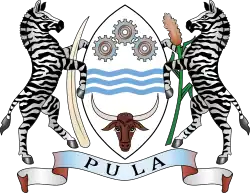| National organization(s) | BFTU |
|---|---|
| Regulatory authority | Ministry of Labour |
| Primary legislation | Trade Disputes Act[1] |
| Global Rights Index | |
4 Systematic violations of rights | |
| International Labour Organization | |
| Botswana is a member of the ILO | |
| Convention ratification | |
| Freedom of Association | 22 December 1997 |
| Right to Organise | 22 December 1997 |
Trade unions in Botswana operate within a longstanding democratic system in which the government of Botswana has ratified the International Labour Organization's core conventions, including Conventions 87 (Freedom of Association) and 98 (Right to Organize).
With the exception of members of the Botswana Defence Force, Botswana Police Service, Local Police, and Prison Service,[2] all workers have the right to join unions. However, in practice trade unions complain of difficulties in operating unfettered.[3] The 2004 Trade Disputes Act is seen by unions as "employer-favoured"[4] and requires submitting grievances to a complex procedure which, it is claimed, invariably results in strike action being declared illegal.
History
Formed in 1948, the Francistown African Employees' Union (FAEU), led by G. M. K. Mmusi was the first trade union in Botswana. It existed until 1970, although only being recognised by the Bechuanaland Protectorate in 1964. The Bechuanaland Protectorate Union, led by Lenyeletse Seretse, was formed in 1959, and in 1962 the Bechuanaland Trade Union Congress (BTUC) was established, with Klaas K. Motshidisi as general secretary. The BTUC, which was allied with the Bechuanaland People's Party, foundered three years later, in 1965; and after independence in 1966, with the help of the International Confederation of Free Trade Unions (now ITUC), trade unions in Botswana formed the Bechuanaland Federation of Labour.[5]
In the 1970s the Botswana Trade Union and Education Centre was created, and it was replaced in 1977 by the current national trade union centre, the Botswana Federation of Trade Unions (BFTU).
Present day
The BFTU is still the sole national trade union centre in Botswana. Most unions are organized at the enterprise level, with few resources available for cross-enterprise structures such as industrial or craft unionism.[5][6]
The government of Botswana appears to take a pragmatic approach to trade unions, arguing that they should be formed in order to encourage fair labour practices, facilitate education of workers, and reduce conflicts between individual employees and employers.[7]
References
- ↑ "Trade Disputes Act" (PDF). Government Gazette. Retrieved 2007-08-07.
- ↑ "Trade Unions and Employers' Organisations (Amendment) Act, 2003 - Act No. 16 of 2004". NATLEX (International Labour Organization). Retrieved 2007-08-07.
- ↑ "Slow progress in Botswana's labour rights". afrol News. Retrieved 2007-08-12.
- ↑ "Botswana (2006)". ICFTU Annual Survey of Violations of trade union rights. Retrieved 2007-07-31.
- 1 2 ICTUR; et al., eds. (2005). Trade Unions of the World (6th ed.). London, UK: John Harper Publishing. ISBN 0-9543811-5-7.
- ↑ "Policy position paper on globalization – 2007" (PDF). Botswana Federation of Trade Unions: 25. Archived from the original (PDF) on 2007-09-26.
- ↑ "Botswana: 'Gus' Explains Govt Stand On Trade Unions". Mmegi. Retrieved 2007-08-12.
